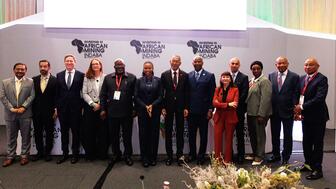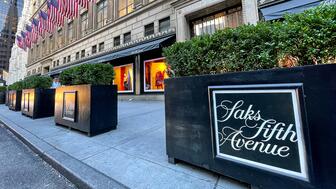Parent company Saks Global is also closing nearly all Saks Off 5th locations, a Neiman Marcus store, and 14 personal styling suites.
Supreme Court Divided on Issue of Online Sales Tax
Some justices say the current structure for collecting sales tax for items bought online needs to be updated while others argue it’s an issue for the legislative branch.

Washington--The U.S. Supreme Court heard arguments Tuesday morning in the case that could, or could not, change Quill, the decades-old decision governing collection of sales tax online.
The case, South Dakota vs. Wayfair Inc. et al, pits proponents of online sales tax collection, including states and retail organizations like Jewelers of America and the National Retail Federation, against online sellers like Jewelry Television, Etsy and eBay.
At issue is Quill vs. North Dakota, the 1992 Supreme Court ruling that prevents states from collecting sales tax from sellers with no physical presence, meaning a store, a warehouse, etc., in the state.
Heading into oral arguments, two justices who often find themselves on opposite sides of an issue—Justices Anthony Kennedy and Neil Gorsuch—had publicly expressed support for overturning Quill, a decision that Gorsuch described Tuesday as “antiquated.”
Justice Ruth Bader Ginsburg indicated during oral arguments that she agreed with Kennedy and Gorsuch, stating that those opposed to overturning Quill make the case that asking an out-of-state seller to collect tax on goods shipped in-state discriminates against interstate commerce.
“But as I see it,” she said, “why isn’t it, far from discriminating, equalizing sellers; that is, anyone who wants to sell in-state, whether an in-state shop, an out-of-state shop, everybody is treated to the same tax collection obligation. All who exploit an in-state market are subject to the in-state tax. Why isn’t that equalizing rather than discriminating?”
However, Justices Sonya Sotomayor, Samuel Alito and Elena Kagan seemed to agree that while Quill is outdated, the issues of governing sales tax collection is best left to Congress due to the complexities involved.
“From this court’s perspective, the choice is just binary. It’s you either have the Quill rule or you don’t,” Kagan said. “But Congress is capable of crafting compromises and trying to figure out how to balance the wide range of interests involved here.
“Now, the general (South Dakota Attorney General Marty Jackley, who spoke on behalf of the state in front of the court) said Congress hasn’t done that, but … Congress can decide when it wants to craft a compromise and when it doesn’t want to craft a compromise. And then Congress, if it decides it wants to craft a compromise, can craft a compromise in ways that we cannot.”
Justice Stephen Breyer mentioned that placing the administrative burdens of having to collect sales tax in every state could hinder smaller online sellers from entering the
And Chief Justice Roberts indicated that the time to overturn Quill has come and gone.
“In terms of economic impact, I mean, the suggestion in some of the briefs is that this is a problem that has peaked in the sense that the bigger e-commerce companies find themselves with physical presence in all 50 states. So they’re already covered.”
This includes the biggest online retailer in the country, Amazon, which announced last March that it would begin collecting sales tax in all 50 states.
“And,” Roberts continued, “the workarounds that some of the states have employed are also bringing more in. If it is, in fact, a problem that is diminishing rather than expanding, why doesn’t that suggest that there are greater significance to the arguments that we should leave Quill in place?”
The issue of online sales tax collection ended up before the Supreme Court because of a law South Dakota passed in March 2016 requiring companies that make more than $100,000 in sales or have more than 200 transactions per calendar year remit sales tax whether or not they have a physical presence in South Dakota.
Three online retailers, Overstock.com Inc., Wayfair Inc. and NewEgg Inc., filed a lawsuit against the state and ultimately won, with the South Dakota Supreme Court ruling that the U.S. Supreme Court’s 1992 Quill decision, however dated, remains the controlling precedent on the issue of interstate tax collection.
South Dakota petitioned the Supreme Court to reconsider Quill in October 2017. In January, the court agreed to do so.
A complete transcript of Tuesday’s oral arguments in South Dakota vs. Wayfair Inc. et al is available on the Supreme Court’s website.
A decision in the case is expected before the court’s current term ends in late June.
The Latest

It is believed the 24-karat heart-shaped enameled pendant was made for an event marking the betrothal of Princess Mary in 1518.

The AGTA Spectrum and Cutting Edge “Buyer’s Choice” award winners were announced at the Spectrum Awards Gala last week.

Launched in 2023, the program will help the passing of knowledge between generations and alleviate the shortage of bench jewelers.

The “Kering Generation Award x Jewelry” returns for its second year with “Second Chance, First Choice” as its theme.


Sourced by For Future Reference Vintage, the yellow gold ring has a round center stone surrounded by step-cut sapphires.

The clothing and accessories chain announced last month it would be closing all of its stores.

Criminals are using cell jammers to disable alarms, but new technology like JamAlert™ can stop them.

The “Zales x Sweethearts” collection features three mystery heart charms engraved with classic sayings seen on the Valentine’s Day candies.

The event will include panel discussions, hands-on demonstrations of new digital manufacturing tools, and a jewelry design contest.

Registration is now open for The Jewelry Symposium, set to take place in Detroit from May 16-19.

Namibia has formally signed the Luanda Accord, while two key industry organizations pledged to join the Natural Diamond Council.

Lady Gaga, Cardi B, and Karol G also went with diamond jewelry for Bad Bunny’s Super Bowl halftime show honoring Puerto Rico.

Jewelry is expected to be the No. 1 gift this year in terms of dollars spent.

As star brand Gucci continues to struggle, the luxury titan plans to announce a new roadmap to return to growth.

The new category asks entrants for “exceptional” interpretations of the supplier’s 2026 color of the year, which is “Signature Red.”

Entries for the jewelry design competition will be accepted through March 20.

The Ohio jeweler’s new layout features a curated collection of brand boutiques to promote storytelling and host in-store events.

From heart motifs to pink pearls, Valentine’s Day is filled with jewelry imbued with love.

Prosecutors say the man attended arts and craft fairs claiming he was a third-generation jeweler who was a member of the Pueblo tribe.

New CEO Berta de Pablos-Barbier shared her priorities for the Danish jewelry company this year as part of its fourth-quarter results.

Our Piece of the Week picks are these bespoke rings the “Wuthering Heights” stars have been spotted wearing during the film’s press tour.

The introduction of platinum plating will reduce its reliance on silver amid volatile price swings, said Pandora.

It would be the third impairment charge in three years on De Beers Group, which continues to grapple with a “challenging” diamond market.


The Omaha jewelry store’s multi-million-dollar renovation is scheduled to begin in mid-May and take about six months.

The “Paradise Amethyst” collection focuses on amethyst, pink tourmaline, garnet, and 18-karat yellow gold beads.

The retailer credited its Roberto Coin campaign, in part, for boosting its North America sales.





























